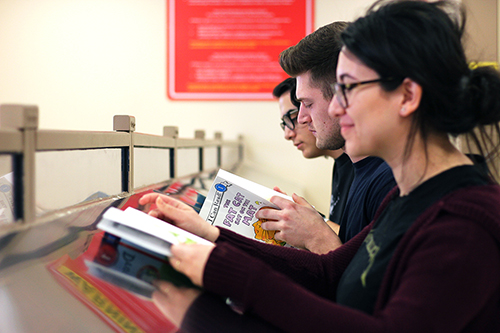
 Story printed with permission from The Lamron; written by Malachy Dempsey.
Story printed with permission from The Lamron; written by Malachy Dempsey.
Photo left: Geneseo’s Features and Opinion Writing class is working with inmates from the Livingston County Jail to record them reading children’s books to send to their children. Pictured are junior Rebecca Buchman, senior Colby Burke and junior Johnathan Saponara, working on the project. (Ash Dean/Photo Editor)
Two Geneseo classes have partnered with the Livingston County Jail to record inmates reading books to send to the inmates’ children as part of the national “Storybook Project.” Many students enrolled in these classes hope that participating in the project will create a positive change in the inmates’ lives as well as in their families’.
Lecturer of communication Ginni Jurkowski’s classes Features and Opinion Writing and Public Relations Writing are collaborating with the jail, the latter working solely on publicity. Students from the Features and Opinion Writing class must visit the jail twice a week to record the book reading, according to Jurkowski. Students then digitalize the recording and prepare it for mailing; the jail then mails the recordings to the inmate’s family.
The Livingston County Jail decided to participate in the Storybook Project in order to further extend its outreach to the community, according to a phone interview with Livingston County Jail Chief Deputy Jason Yasso.
“We liked the idea just as another form of outreach to the community,” he said. “We’ve also always had the opinion that sometimes people make bad decisions, which result in parents being incarcerated, but that’s never the child’s fault. We thought it was a worthwhile project and something that was feasible.”
The class outreach program satisfies many students’—as well as SUNY’s and Geneseo’s—priorities of applied learning, according to Jurkowski.
“Millennial students typically like a cause and like to work on something in the real world,” she said. “SUNY wants applied learning so that students have hands-on experience, and it also has what SUNY Geneseo wants, which is for students to be civically engaged. The class blends all of those things together.”
Thus far, the jail has sent 35 recordings to families of inmates. Jurkowski predicts that there will be approximately 30 recordings sent out per month until the classes end for the semester. The jail is interested in continuing the program either with volunteers from the community or with its own staff in the future, according to Yasso.
Communication major senior Nicole Cardno detailed one experience that she had while working at the jail with an inmate that made her feel that the project was beneficial to the inmates and their families.
“The person that I had was reading one book called Me and My Dad and he started hysterically crying during it,” she said. “It was overwhelming, but he kept reading and you could tell how much the project actually had an impact on him based on how he acted. Most people would just read the story, say thanks and leave, but with him I actually knew there was some connection.”
Communication major junior Candace Pedraza said that this collaboration with the jail has provided her with a new perspective on the role of law enforcement.
“Given the current times, it’s kind of hard to trust law enforcement, but the guards were probably the most helpful in the entire experience, and they were very open to explaining how the prison works,” Pedraza said. “They were also very friendly to the inmates while we were there, which seemed genuine, and it seemed like they were trying to create a controlled, but not authoritative environment for the inmates.”
The supplies for the Storybook Project have come at no additional cost to the taxpayer, according to Jurkowski. Instead, the books are either donated or covered by the jail-wide commissary account, and the postage for the packages comes from individual inmates’ commissary accounts.
Pedraza believes that the program is important beyond the college and the community and hopes that such an initiative provides people with a different perspective of the criminals in the prison system.
“I think that humanizing that aspect of incarceration is really important,” she said. “A lot of times people demonize people that are arrested or are in prison, which leads to a lot of false perceptions of the prison system. I feel like showing different sides of people helps a lot to have people have more empathy for them.”
Related Stories
No post found!
